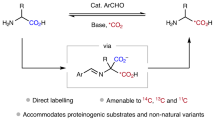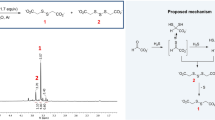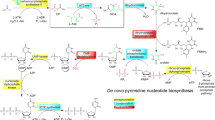Abstract
THERE have been several reports of carbon isotope effects during the decarboxylation of dibasic carboxylic acids such as malonic acid1. Similar effects would be expected in the radical reaction:  The rate at which the radical R.14CO.O dissociates is expected to be less than that for the corresponding reaction of the radical R.12CO.O.
The rate at which the radical R.14CO.O dissociates is expected to be less than that for the corresponding reaction of the radical R.12CO.O.
This is a preview of subscription content, access via your institution
Access options
Subscribe to this journal
Receive 51 print issues and online access
$199.00 per year
only $3.90 per issue
Buy this article
- Purchase on Springer Link
- Instant access to full article PDF
Prices may be subject to local taxes which are calculated during checkout
Similar content being viewed by others
References
Melander, L., Isotope Effects on Reaction Rates, 132 (Ronald Press Co., New York, 1960).
Bevington, J. C., Radical Polymerisation, 41 (Academic Press, London, 1961).
Allen, J. K., and Bevington, J. C., Polymer, 2, 265 (1961).
Author information
Authors and Affiliations
Rights and permissions
About this article
Cite this article
BATES, T., BEVINGTON, J. A Carbon Isotope Effect in the Decarboxylation of the Anisoyloxy Radical. Nature 197, 1294–1295 (1963). https://doi.org/10.1038/1971294a0
Issue Date:
DOI: https://doi.org/10.1038/1971294a0
Comments
By submitting a comment you agree to abide by our Terms and Community Guidelines. If you find something abusive or that does not comply with our terms or guidelines please flag it as inappropriate.



